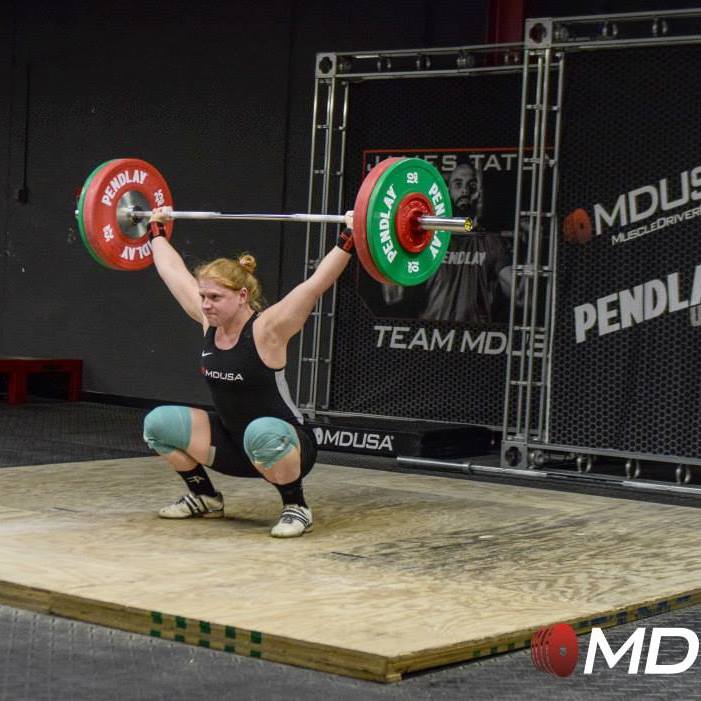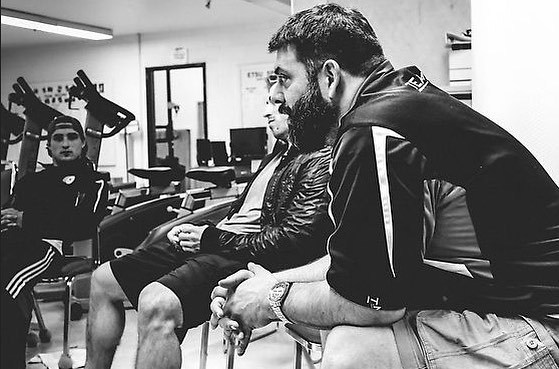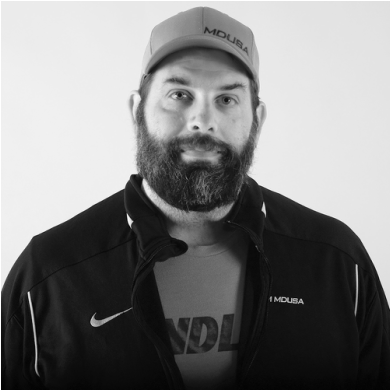This has been a tough week for the weightlifting world.
No, I take that back! It has been a rough week for the strength world. Coach Pendlay’s reach goes well beyond the weightlifting world.
I have been in the strength world for 35 years now, beginning with a barbell at 11 years old. I knew the name of “Pendlay” way before I met him in 2013. Coach Pendlay was a wealth of knowledge, and he shared that knowledge with the world in the form of podcasts, articles, and the infamous “Pendlay Forum.”
In 2013, I read that MuscleDriver USA was starting the first professional weightlifting team – and they’d be right down the road from me in Fort Mill, SC. That’s basically Charlotte, NC if you know the area. When I read about it, I had to see it with my own eyes. I was at a strength and conditioning clinic in Charlotte one weekend, and I decided on a whim simply to drive over to MDUSA HQ. It was Max Out Friday, and my world hasn’t been the same since then.
I had just started dabbling back into the world of weightlifting, with my main focus being strength and conditioning. My first two weightlifting athletes were Rebecca Gerdon and Matt Wininger – and coaching them had already ignited my love for the sport all over again. I personally competed in weightlifting from 1996 until 2000. I made a change to powerlifting mainly because I moved and couldn’t find a training location. I never got over my love for the sport, and Coach Pendlay (along with MDUSA) enabled me to finally turn my love into a career that had never before existed.

When I walked into their training hall, Coach Pendlay met me at the door. Luckily he knew me and allowed me to hang out and watch practice. It was such an amazing experience. My friend Sam had introduced me to the Cal Strength videos a few months prior to this visit, so it was quite surreal to have Jon North, Donny Shankle, and the rest of the crew right before my eyes. The original Cal Strength videos did an incredible job with character development. It was easy to see the personalities made those videos so good and not the editing.
Coach Pendlay was a character. He was this massive man with the thickest black beard that one could imagine. He was a weightlifting meathead with a brain. It was his brain that attracted me. It was his brain that drew me to MDUSA. I remember one random night when he called me out of the blue at 11pm. I looked at my wife and showed her who was calling. There was no doubt that I was going to take that call.
We talked for hours about his theory of increased frequency. He hypothesized that if athletes would train everyday and multiple times per day (4-6 times) for shorter periods (20-40 minutes) they would improve dramatically faster. He cited a research project he had been a part of with mice. During the research, they had two groups of mice performing work on a resisted wheel. Both groups performed the same amount of work with the same amount of resistance. However, one group performed the work everyday in short intervals – and the other group performed the work three days per week. The higher frequency group improved exponentially in regards to hypertrophy and absolute strength.

A few months after telling me all about this idea of his, I saw that he was trying out his idea on his weightlifting team. Later he told me the only athlete who improved was Mike Szela. However, they didn’t stick with the project long enough to really find out if it would work or not. I guess too many of the athletes complained, so they scrapped the idea. Something like that has to play out for a minimum of 12 or more weeks to allow for adaptation. We might never have a situation to even try out such an idea because you need a professional team to give the athletes the proper environment needed to allow for all-day training.
Coach Pendlay was a visionary like a lot of us. However, unlike a lot of us, he had the ability to make these visions come to fruition. Coach Pendlay had heard the same criticisms all American weightlifting coaches have heard for years – that American coaches and American lifters are subpar. He knew like the rest of us that America’s results on the international stage had nothing to do with the abilities of our coaches. Yet it had everything to do with these two things:
1. Getting more athletes to choose from, giving us a better pool.
2. Giving those athletes the tools necessary to succeed.
America is filled with amazing athletes. That is clear during every Olympics when we dominate the overall medal count. However, weightlifting was still in the shadows with only a small cult following. That’s not the way to win on the world level. The Cal Strength videos spearheaded mainly by the Godfather Dave Spitz helped to pull weightlifting out of the shadows and onto the YouTube screens of millions of people. Along with CrossFit, weightlifting was now a sport that millions recognized.
Once the people could see that weightlifting was a sport filled with beautiful movement requiring skillful gymnastic-like precision, there was only one piece of the equation missing that prevented the sport from exploding in America: money. Let’s face it. With sports like football, basketball, baseball, and even wrestling promising scholarships and future professional arenas, it’s hard to compete. Coach Pendlay’s vision of corporate sponsorship changed all of that.
MDUSA changed things forever. They paid athletes thousands of dollars per month, paid for travel, paid for competition expenses, provided chiropractors, and so much more. The exposure opened athletes up to personal sponsorships, online coaching, and other creative revenue streams. MDUSA was the first of its kind since York Barbell. The team gave the company a brand that enticed people to buy from MDUSA out of loyalty to the athletes. People felt they knew the team and they wanted to be a part of what was happening.
Personally I still feel this needs to go further for weightlifting in America to continue its climb in the international ranks. Coach Pendlay’s vision was dead on. Brad Hess, owner of MDUSA, took the risk – which I will admire for the rest of my life. However, his followthrough wasn’t the best. We needed better character development with more videos and live streaming to really bring the team to life. Dave at Cal Strength had the right idea with the YouTube videos, but for some reason MDUSA didn’t continue with the same vigor. The team helped to skyrocket MDUSA sales without even taking a wise approach. But two distinct bad decisions brought the empire to its knees.
Coach Pendlay had it right, man. We are a capitalist country. Therefore, it’s capitalism that will make or break our sport. MMA is huge because of corporate sponsors – just like football, baseball, boxing, and all the rest. A lot of coaches in USA Weightlifting look to our governing body, USA Weightlifting, to solve all of their problems. Look, Phil Andrews is amazing. We wanted a good leader, and we got a great one. Stipends are at an all-time high. Athlete support is at an all-time high. Phil did this during a time when most leaders would have hung their heads with the closing of the weightlifting program at the Olympic Training Center. Instead Phil has crushed it, and has our sport performing better than ever.
But it is my belief that our sport will be in need of something much more for this success to continue into 2024 and beyond. It is Coach Pendlay’s vision that will have to be implemented for this sport to take its next big step towards international dominance. Sorry to rant as this was meant to be a tribute to Coach Pendlay, but his vision runs hand in hand with what the sport needs.
Besides his vision of corporate sponsorship, it was his simplistic view of programming and coaching that influenced me the most. He was very Bulgarian-ish in his programming. He focused on the competition lifts of the snatch and clean and jerk along with front and back squats. He didn’t program a lot of accessory work, which is where we differ a bit. However, he believed in maximum effort work, which is where most great coaches agree. If you want to lift big weight, eventually you have to lift big weight.
In talking to the top coaches in America – Dave Spitz (coach of Wes Kitts), Josh Galloway (Kate Nye’s coach), and Dave Ester (Mattie Sasser’s coach) – we all agree that max effort has its place. There are a few coaches who take a bit of a different approach with success, but in my observation the coaches who at least have maximum effort scheduled once per week are noticing faster improvement than the others. Coach Pendlay spearheaded that approach.
He realized that Americans couldn’t perform an identical Bulgarian program because 1) they’re not on drugs and 2) they don’t have the base that Bulgarians had from starting at younger ages. It was with Coach Pendlay that Max Out Friday was born. I use this concept in my programming to this very day. Fridays we are going to go heavy – either with a 1RM snatch or clean and jerk, a complex version of the two lifts, or a repetition maximum of the two competition lifts.
Coach Pendlay also taught me to keep notes on all of my athletes with a notebook. This system allowed him to individualize the programs of each athlete for competition preparation, peaking, and tapering. He also took notes on warm ups, attempt selection, and the flow of warm ups. It seems simple, but the majority of coaches don’t do it. Some might take the notes, but they don’t have the skill of implementation.

Like him or not, Coach Pendlay changed the face of weightlifting in America forever. He impacted an industry like most of us can only dream about. Where most of us simply have dreams, ideas, and hopes, this man was able to bring those things to life. He had the gift to make people understand his vision. That’s a gift that makes the difference in him and so many other coaches. He got MDUSA to buy into his vision. He convinced a corporate giant to put their money on the line. He convinced a generation of people that the sport of weightlifting is more than some cult sport. He convinced a generation of people that the barbell is a beautiful thing. He convinced me that this sport can be so much more than it already is.
Coach Pendlay, thanks for daring to dream – and thanks for having the courage to bring that dream to life. Personally I want to thank you for inspiring me to follow my passion. You were my example, sir. You loved the sport of weightlifting and you created a successful life around that love. You did this during a time where most people thought you were crazy – and then those same people hated you because you proved them wrong. I pray that your life will remind us all about what’s really important.
Great tribute and excellent insight. Did the smaller all day workout every become fully implemented?
Seriously gone way too soon! I am also lucky enough to be down in Charlotte and I was able to go down very frequently and watch the team train and lift. Being a beginner lifter and coach I only really met coach Pendlay once, he was a bit intimidating. But his legacy and theories and all the lifters memories and stories of him will live on. And you and Glenn are 100% right, this sport needs more sponsorships to succeed.